faa [fàá] vb. to disgrace; to embarass.

fafa [fàfá] vb. to fade.

fan [fã́] vb. 1. to release; to acquit,
to set free: A fan ọnrẹn vbe eghan ―
“He has been freed from imprison-
ment”. fan ẹdin ― “to cut loose palm
nuts from the tree”, 2. to fall; drop
suddenly: ọ fan fi iguẹ ― “he dropped
suddenly unto his knees”; amẹn fan
fua ― “the rain started to fall
suddenly”.
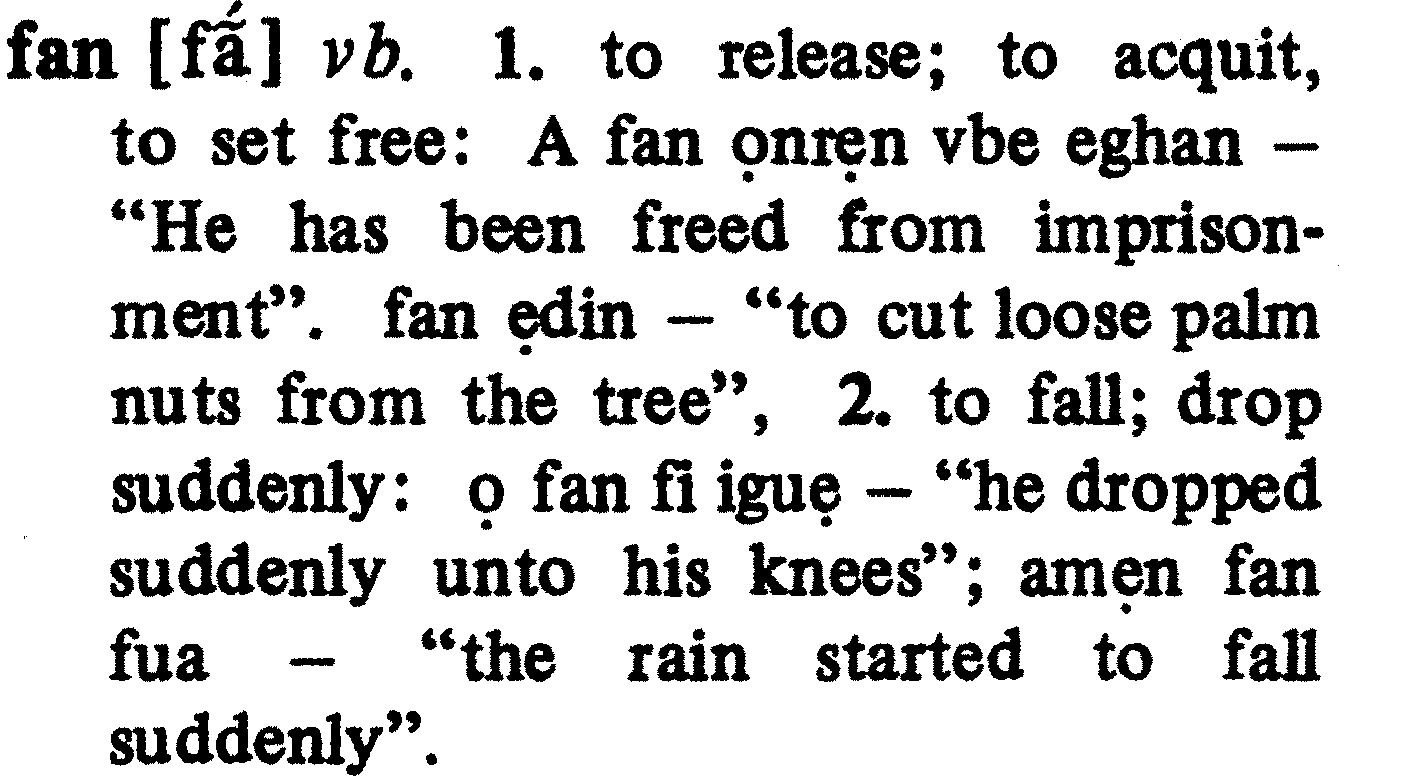
fannọ [fã̀nɔ̃́] vb. 1. to loosen; to
untie; to unfold: fannọ oko ne a ghe
emwin ne ọ rre uwẹre ― “loosen
the parcel so we can look at what
it contains”; 2. plural or reiterative
sense of fan: Iran fannọ avbe oleghan
kua ― “They have released the
prisoners”^.
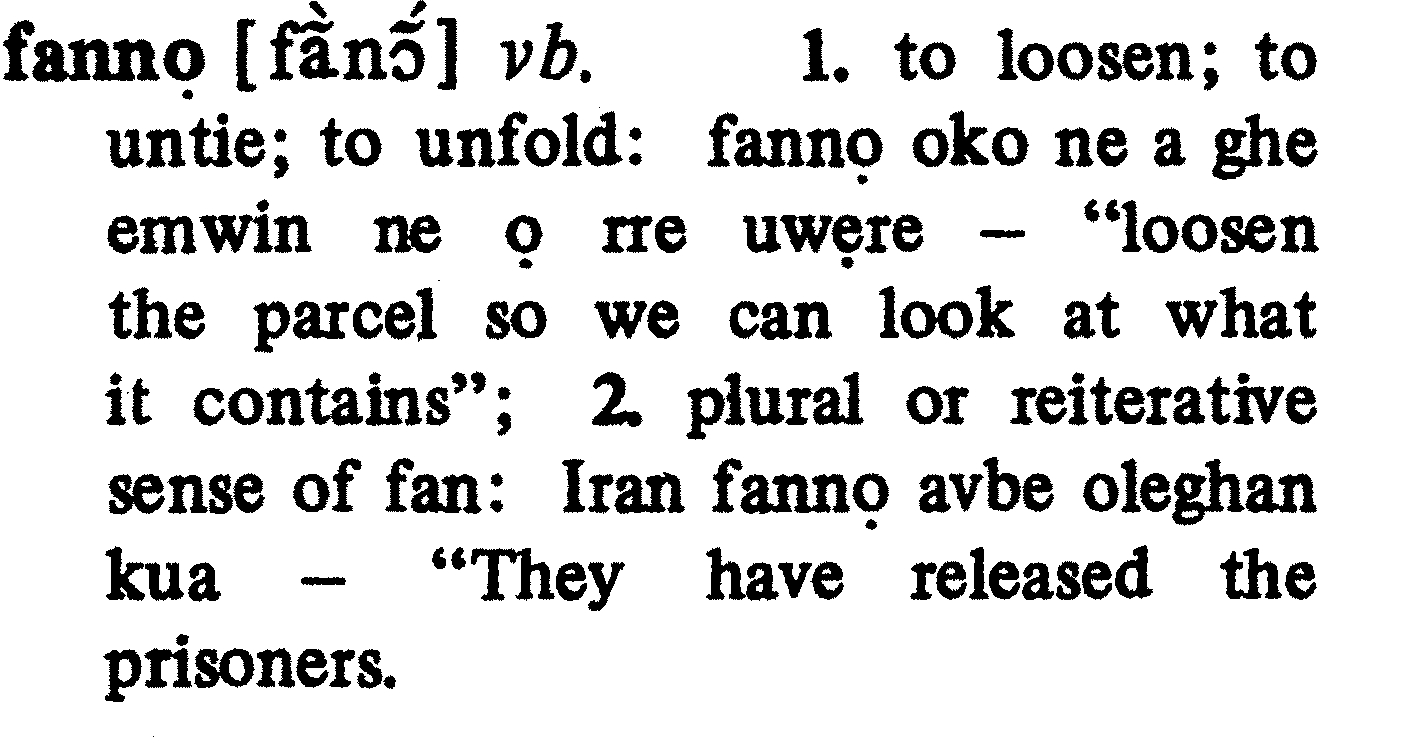
fe1 [fé] vb. to escape; to become
free. Ẹwe fe vbe irri ― The goat has
escaped from the leash; 2. to recover
from illness: Ọ fe nẹ vbe uhunmwonva
ne ọ te vae ― “He has recovered from
the illness that had afflicted him”.
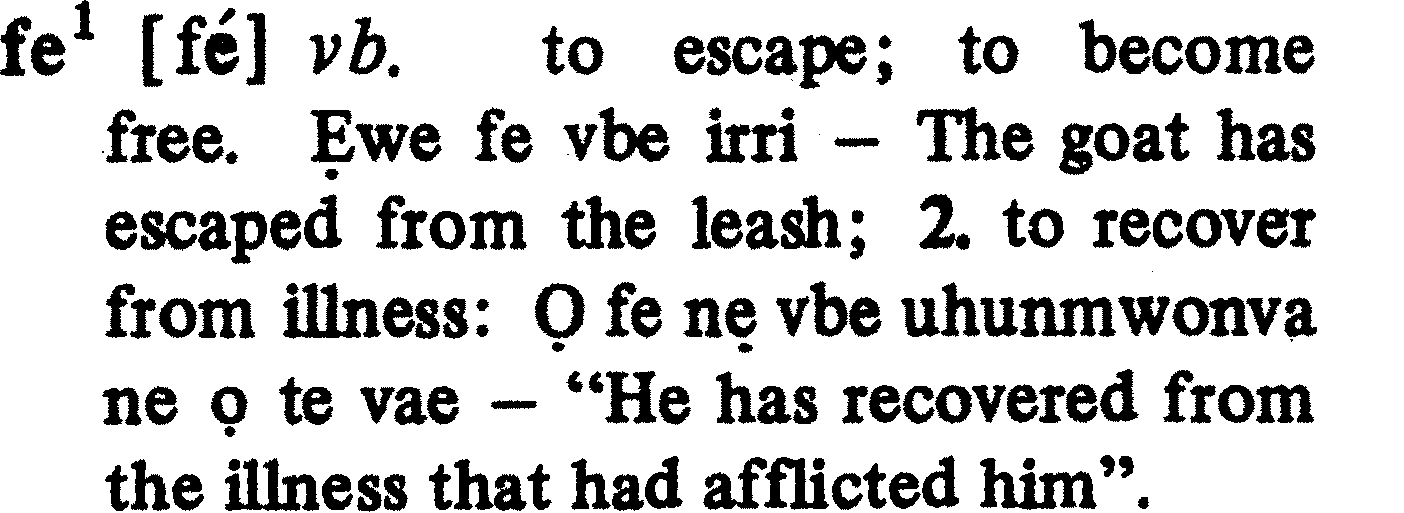
fe2 [fé] vb. to be wealthy; to be rich.

fee [fèé] vb. to make rich; to enrich.

fenma [fẽ́mã̀] vb. (< fan ― ema)
%%

“free yam”: to remove yams from
the yam stack.

fẹfẹrẹfẹ [fɛ́fɛ́ɽɛ́fɛ́] adv. (usually with
the verb fo) entirely; completely;
finally: (also, fẹrẹ) Ọ rri ọre foo
fẹfẹrẹfẹ ― He ate it up completely.

fẹghẹrẹ [fɛ́ɣɛ́ɽɛ́] adj. 1. (used with
the verb “ye”): very light; without
bulk or weight: ọ ghi ye fẹghẹrẹ ―
It has become very light; 2. adv.
lightly; with little effort: Ọ ru ẹre
fẹghẹrẹ ― “He did it with little effort”.
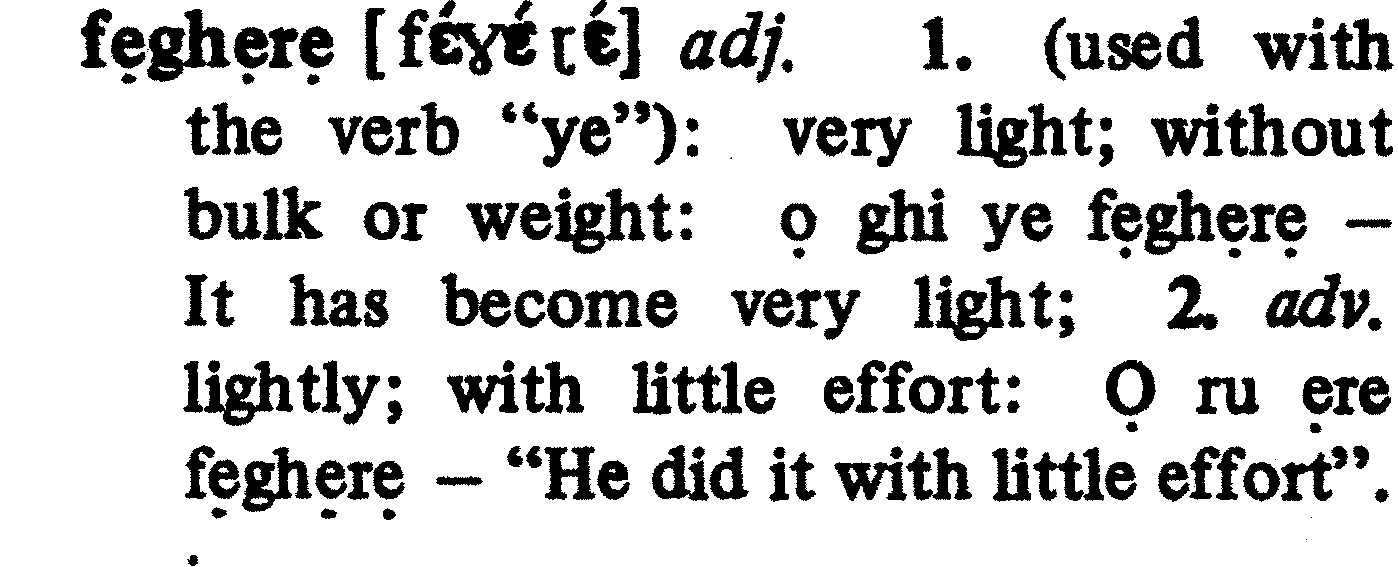
fẹko [fɛ̀kó] vb. to be gentle, mild or
gradual in doing something: Iran fẹko
dee vbe umọdia ― “They are gradually
approaching in the distance.” (also
hẹko).

fẹrẹ [fɛ́ɽɛ́] adv. completely; entirely:
Tue ẹre yọọ fẹrẹ ― “Pour it in com-
pletely: i.e. pour it all in”.

fẹrẹfẹrẹ [fɛ̀ɽɛ̀fɛ̀ɽɛ̀] adv. (occurs with
the verb mu) very sharp: Erọ na mu
fẹrẹfẹrẹ ― “This knife is very sharp.”

fi1 [fí] vb. to throw: ọ fi ígho fii
otọ ― “he threw the money onto
the ground.”

fi2 [fí] vb. 1. to beat (of the pulse)
Udu ere gba fi leilei ― “His heart is
$Page 046$

beating rapidly”. 2. to hit: Ọ fi
ẹre ubi ― “He hit him a slap” i.e.
“He slapped him”.

fi3 [fí] vb. to shoot: ọ fi ahianmwẹn
vbe uhunmwun erhan ― “He shot a
bird on the tree.”

fi4 [fí] vb. to cover; to surround: Erhọn
fi ẹre egbe hia ― “craw-craw covered
all his body: he is covered all over
with craw-craw”, fi ekharha gue
ẹre ― “Spread an umbrella over him:
cover him with an umbrella.”
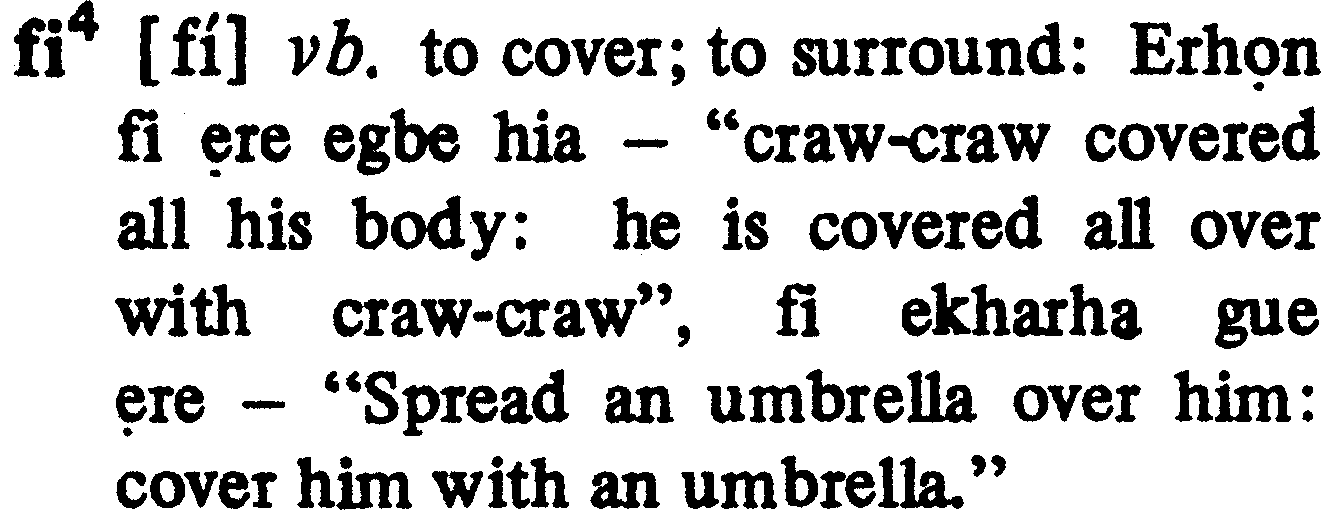
fi5 [fí] vb. to leave behind: Ọ fi ọmọ
yọ mwẹn otọ ― “She left a child
behind with me.”

fi-dọn [fìdɔ̃́] vb. “to throw and miss”:
to miss a target; to make a mistake.

fiagba [fyàgbá] idiom, vb. an idiomatic
expression that means “to summon a
meeting” ― used mainly in folktales.

fián1 [fỹã́] vb. 1. (active sense): 1. to
cut; 2. to break (e.g. of string or
rope); (stative sense): to be cut or
broken; to be loose: Erọ fian mwẹn
obọ ― “The knife has cut my hand.”;
Irri ne u ya dee ẹwe fiaẹn ― “The
rope with which you tied the goat
is broken.” 2. (of money): to change
into smaller denominations (cf. fingho).
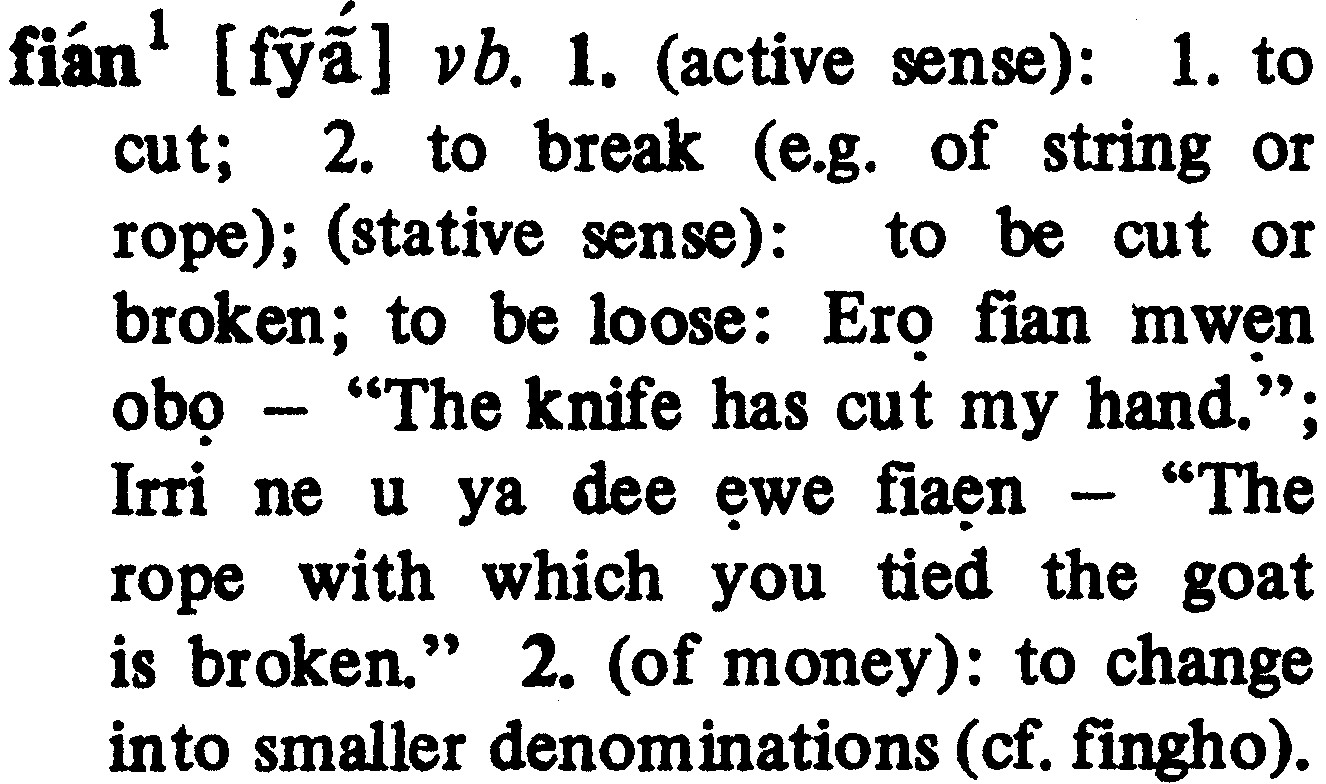
fian2 [fỹã́] vb. 1. to be salty; 2. to
have a sharp smell: Orere hia waa
fian ne ahiọ ― “The entire yard has
a sharp smell from urine”; Uwọnmwẹn
ne u lee waa fian. ― “The soup you
cooked is too salty.”
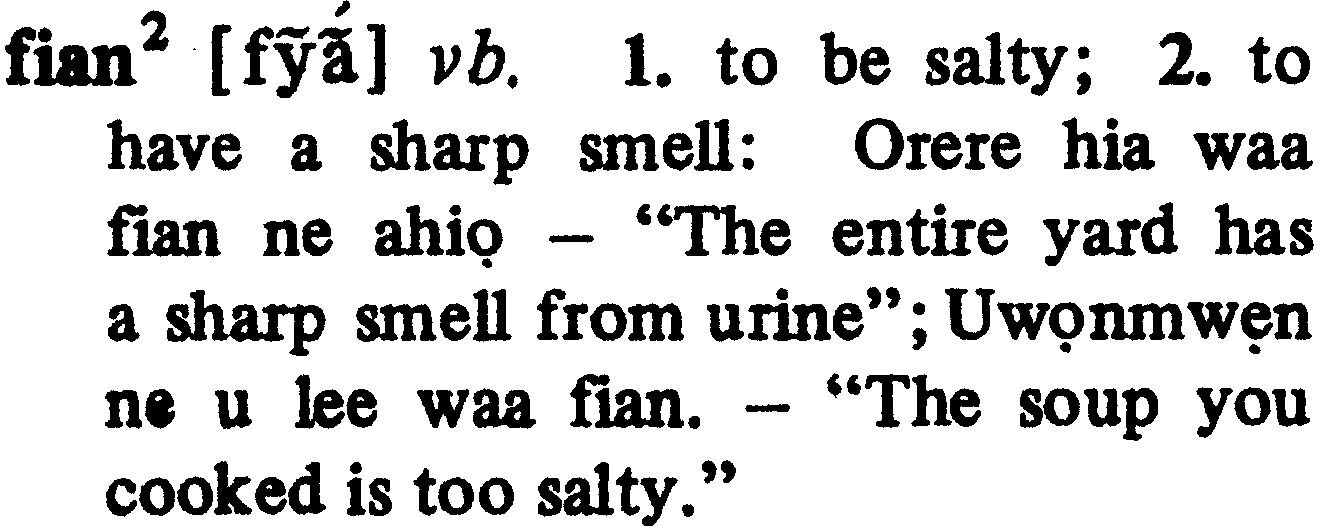
fian-re [fyã̀ɽé] vb. “cut eat”; to bite.

fian-rraa [fỹã̀ràa] vb. “cut cross”: to
cross over (e.g. a river).

fiangbe [fỹã̀g͡bé] vb. “cut in addition
%%

to”: to bless.

fianmwẹn [fỹã̀ɱɛ̃́] vb. to hit (against):
Ọ rhie erhan fianmwẹn ọnrẹn
uhunmwun ― “He took a stick hit
him on the head: He hit his head
with a stick”.
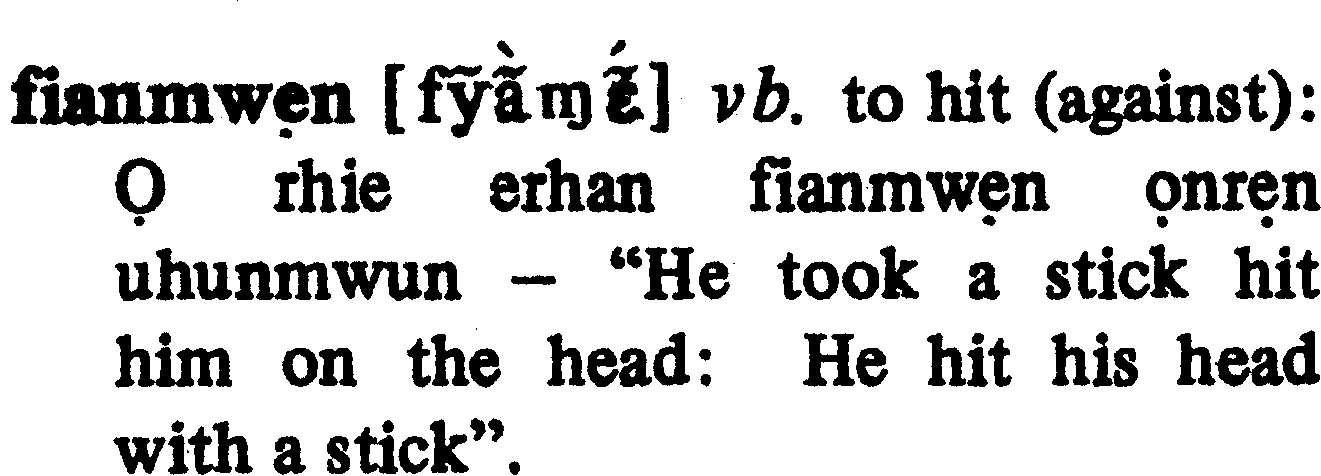
fianyaẹngbe [fỹã̀ỹã̀ɛ̃gbé] vb. (< fian-
yan-egbe) “to cut over body”. to
self-aggrandize; to over-estimate one’s
worth.

fie [fìé] vb. to clear a plot with
hoes and machets in preparation for
farming. This usually precedes the
felling of the trees on the plot.

fieghe [fyèɣé] vb. to swing something;
to sway; to wave: Ọ fieghe obọ daa
mwẹn vbe ọ gberra ― “He waved
hands to me when he passed.”

fienwẹn [fỹẽ̀w̃ɛ̃́] vb. “to cut breast”:
to wean; to be weaned.

fiemwin [fyèɱĩ́ĩ̀] vb. “to hit some-
thing”: to hit (somebody).

fiẹkun [fyɛ̀kṹ] vb. “to throw waist”: to
move the hips back and forth as in
the movements during coitus.

fiẹnfiẹnfiẹn [fỹɛ̃́fỹɛ̃́fỹɛ̃́] adv. des-
cribes a sharp sucking noise, as that
produced when one tries to suck at
bone marrow; or the squeaking noise
of house mice.

fifi [fìfí] vb. 1. to leer with a longing
for something: Ghe fifi yọ mwẹn
evbare ― “Don’t leer at my food.”

fiha [fíhà] vb. “to throw oracle”: to
cast oracle; to consult a diviner.

fii [fìí] adv. into: Ọ de fii ẹzẹ ― “He
fell into the river.”
$Page 047$

fikọ [fìkó] vb. to stand and stare.

filo [fìló] vb. plural or reiterative sense
of fi1 and fi3: 1. throw or drop
things one by one; many people drop-
ping things at the same time; 2. to
shoot things one by one; or many
people shooting things at the same
time.
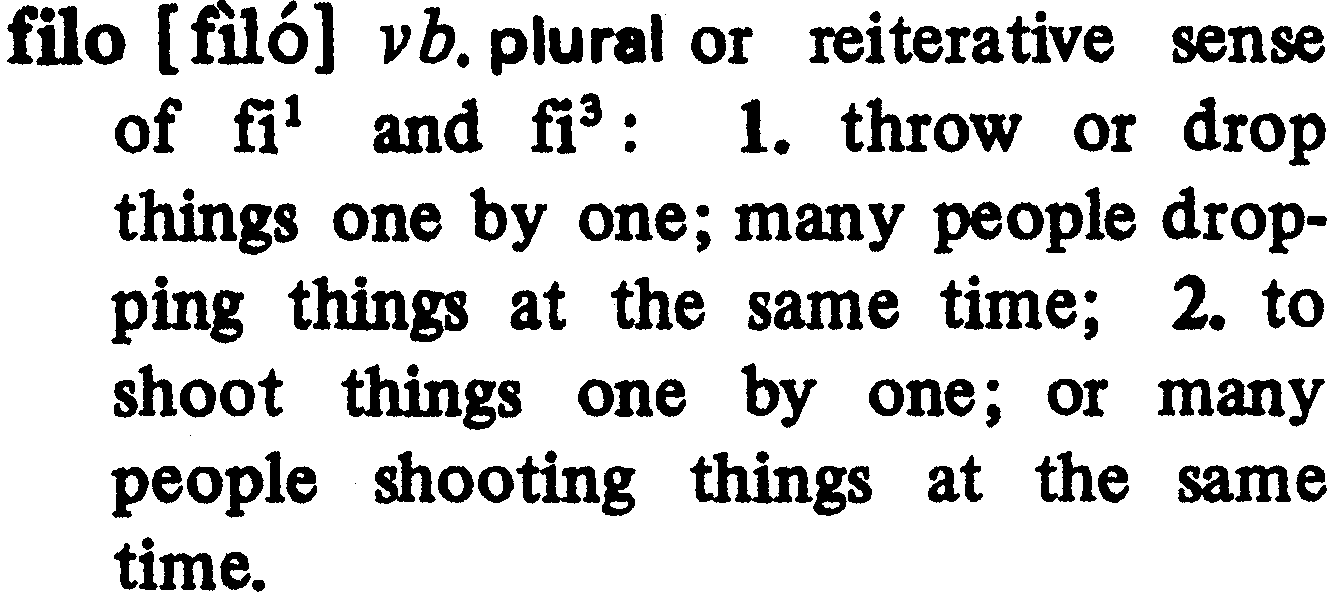
findin [fĩ́dĩ̀] vb. “cut a grave”: to
dig a grave.

fingho [fĩ́ɣó] vb. 1. “cut money”: to
fine; to issue a fine; 2. to change
money into smaller denominations;
to give change.

finhue [fíhué] vb. “to cut nose” 1.
to have a deformed nose; 2. to have
excessive nasality in one’s speech.

finve [fĩ̀vé] vb. “to cut a price”: to
price something.

fioghofiogho [fyóɣófyóɣó] adj. (usu-
ally introduced by the verb ye) very
tall and thin.

fioghoroko [fyóɣóɽóko] vb. to hop
about on one foot.

fiokin [fyókĩ̀] vb. “to throw circles”:
to turn round and round on the same
spot (often leads to giddiness).

fionrueghe [fỹṍɽwèɣè] vb. “to cause
disturbance”: to harass.

fionsughu [fỹṍsuɣù] vb. “to cause
trouble”: to inflict trouble or pro-
blems.

fionvan [fỹõ̀vã́] vb. “to throw a pro-
verb”: to quote a proverb at some-
body, expecting the latter to deter-
mine its meaning.

fiunu [fyùnú] vb. “to throw mouth”:
%%

to speak disrespectfully of, or to,
one’s superior.

fiweriẹ [fìwèriɛ́] vb. to change; to
transform.

fiya [fìyá] vb. 1. to die; 2. to abandon.

fiyekegbe [fíyèkègbé] vb. “to throw
back against”: to ignore; to neglect.

fo [fó] vb. to finish; to end: evbare
foo vbe owa ― “food is finished in
the house.”

foo [fòó] adv. completely; totally: I
tie ebe nii foo ― “I read that book
completely”.

fọ [fɔ́] vb. (used with ọfọ as subject)
to perspire: ọfọ fọ mwẹn ― “Per-
spiration is perspiring me”: I am
perspiring.

fọrhiọn [fɔ̀řyɔ̃́] vb. “to finish strength”:
to faint; to pass out.

fu [fú] vb. to be gentle; docile: ekita
naa fu gbe ― This dog is very docile.

fua1 [fùá] vbl. part (usually occurs with vbs
such as rhie, mu, fi, de, etc.) and
indicates that the relevant object/
subject of the main verb is thrown
away, or out: ọ de fua ― “It fell
out”: it dropped.
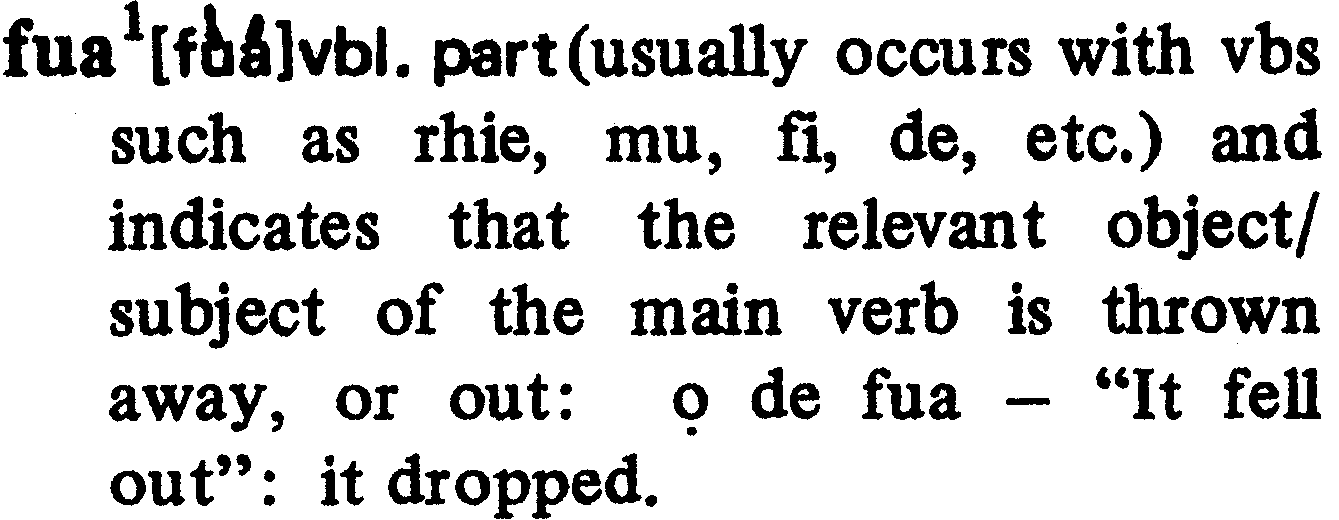
fua2 [fwá] vb. to be white or whitish
(also fuọfua).

fuan [fũ̀ã́] vb. to perish; to be an-
nihilated.

fuegbe [fwègbé] vb. “to be gentle to
body”: to suit; to be agreeable for.

fuẹko [fwɛ̀kó] vb. “to be gentle in the
belly”: to be of a gentle disposition.
$Page 048$

fuẹn1 [fwɛ̃́] vb. to stamp and roll about
in: Ibieka nii gha fuẹn vbe ekhuọrhọ ―
“^Those children are stamping and
rolling about in the mud.”

fuẹn2 [fwɛ́] vb. to waste; to squander:
Ọ fuẹn igho erhae hia foo ― “He
squandered all his father’s money
completely.”

fuẹnfuẹn [fũ̀ɛ̃̀fũ̀ɛ̃̀] adv.; adj. (usually
introduced by the vb. ye) 1. very
weak; almost lifeless e.g. a dying
fire; 2. (with hẹwẹ) fast; repeatedly:
Ọ hẹwẹ fuẹnfuẹn ― “He is panting”.

fuẹnrhẹn [fwɛ̃̀rɛ̃́] vb. to smear on: Ọ
ya uwọnmwen fuẹnrhẹn egbe hia ―
He smeared himself all over with
soup.
%%

fuozu [fwózú] vb. to be blind. (also
fuezu).

fuọfua [fwɔ̀fwá] vb. to be white or
whitish (also fua).

furhu [fùřú] vb. to grab; to snatch, to
rush for, (usually of many objects
and by more than one participants):
Iran furhu ehia foo ― “They have
grabbed it all completely”. (also fuu).
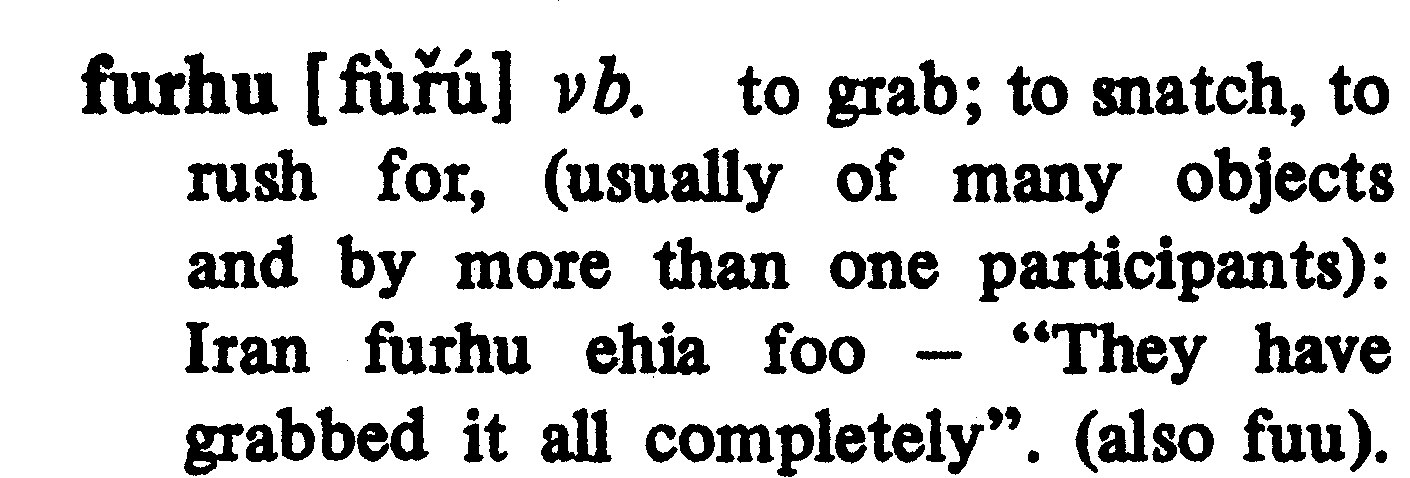
furhẹmwẹn [fùřɛ́ɱɛ̃̀] vb. “to rush
words”: to stutter. (also furhuẹmwẹn).

fuu [fùú] vb. (usually in relation to
large quantities): to grab; to appropri-
ate greedily; to snatch.
